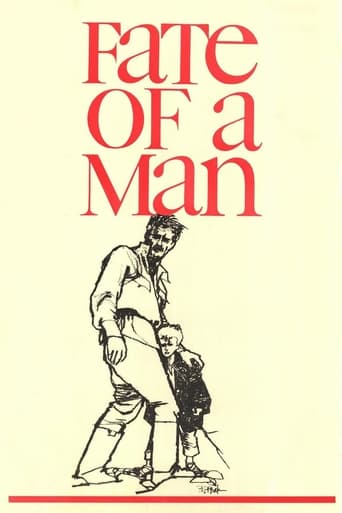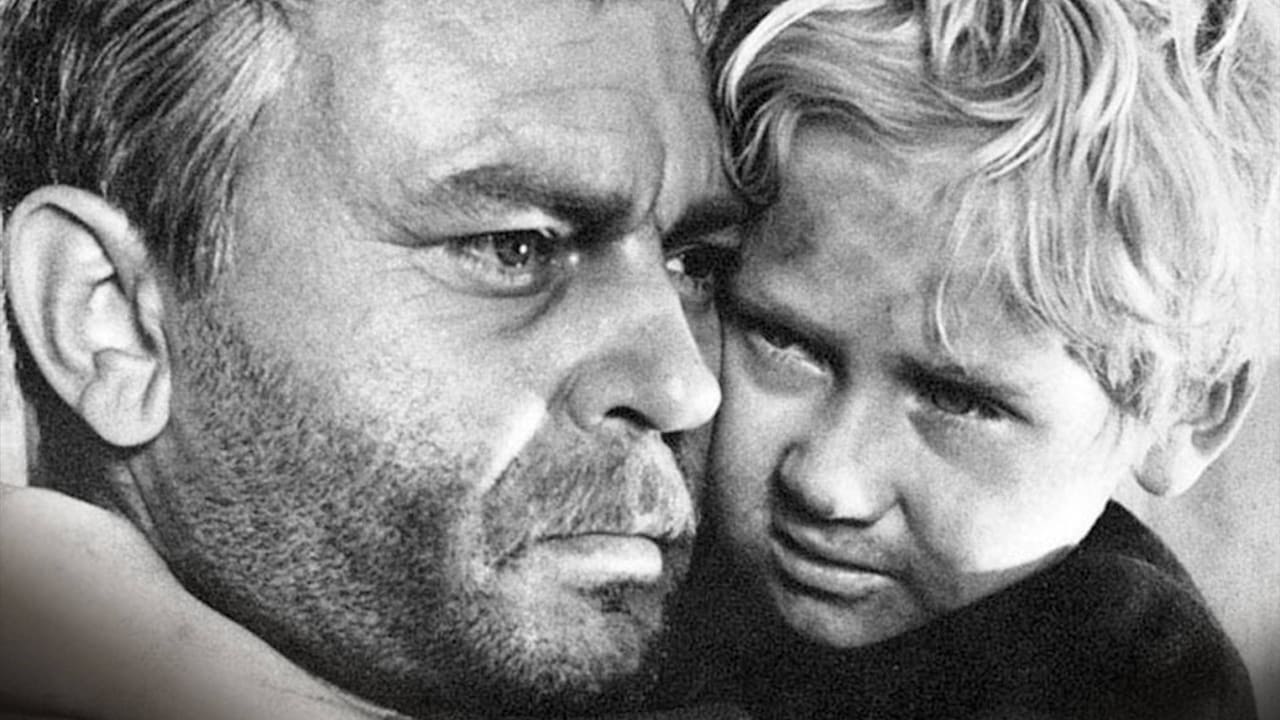Claudio Carvalho
After the Russian Civil War, the Russian worker Andrei Sokolov (Sergei Bondarchuk) marries his beloved Irina (Zinaida Kirienko) and seventeen years later, the couple has a son and two daughters. The family man Andrei is summoned by the Red Army as truck driver in the World War II and he promises to Irina that he will return to his family. Andrei drives through a road that is bombed and he is captured by the Germans and suffers in the prisoner camps. He finds strength to resist the maltreatment of the German soldiers thinking in Irina and his children. Andrei succeeds to escape from the Germans and finds that Irina and their daughters were killed during the bombing of their house and his son Anatoly is a Captain of the Russian Army. Near to the end of the war, Anatoly dies and Andrei does not see any motive to live. Until the day that she sees the starving orphan Vanja begging on the streets of Uryupinsk."Sudba Cheloveka" is a magnificent Russian anti-war film with the nightmarish saga of a survivor of World War II. The narrative is perfect, with top-notch screenplay, direction, performances, cinematography and scenarios. The film gives the sensation of documentary and I am not sure whether the director Sergei Bondarchuk used in his debut inserted footages to give more realism to the movie. The sequence when Andrei meets the orphan boy is touching and never corny and closes this little masterpiece with golden key. My vote is nine.Title (Brazil):"O Destino de um Homem" ("The Destiny of a Man")
Theo Robertson
I've seen a few Russian war films recently and noticed that they feel more like Hollywood war films . Both THE STAR and 9TH COMPANY suffer from this . COME AND SEE didn't . It was a brutal , unforgettable war film made during the late communist era of the Soviet Union showing the bestial atrocities forced upon the Soviet people . I did have high hopes that being a Soviet film rather than a Russian one DESTINY OF A MAN would show the suffering the Soviets endured from 1941-45 . Does it ? Yes to a degree but there's some faults in the story telling The story is told in flashback by Andrey Sokolov . He is taking his son for a walk in the countryside and meets a man and tells him of his wartime service . Conscripted in to the army as a driver he is captured by the Germans early in the war . He suffers deprivation as he's used as slave labour , sees comrades murdered by the Nazis , comes close death several times . Escapes and makes it back to his own lines where he's treated as a hero . He finds his wife and daughter died during an air raid and as the last days of the war take place his last child , a Red Army officer is killed in the Battle Of Berlin . Devastated Sokolov finds some comfort when he finds an orphan and adopts him as his son It's not a film that has a strong central plot . It is rather episodic but where it succeeds is showing the brutality of the Nazi regime against conquered people . Caputured officers , political commissars and Jews were shot out of hand and as Sokolov finds himself behind Nazi lines there's a scene where people go in to a camp with a large chimney bellowing smoke . The implication is stark and obvious - you enter via the front gate and leave via the chimney Ironically by drawing attention to the murderous intent of Nazism it leaves some plot holes involving Sokolov . He escapes from a forced labour detail and hides in the countryside for four days and is then recaptured . But would the Nazis allow an escaped prisoner to live ? Lkewise a brutal SS camp commander says he's going to execute Sokolov but then changes his mind because Sokolov can hold his drink There's another unlikelihood and that is when Sokolov escapes to the Soviet front lines kidnapping a German officer with important documents and being lauded as a hero , but would this have happened in real life ? It's a forgotten point of history that Soviet prisoners captured during the war would receive little sympathy from their leaders after being liberated . Many of them would be sent on a death march to Soviet gulags . It's disappointing that this aspect is never referred to , especially since Soviet leader Nikita Khrushchev instigated a de-Stalination program in the late 1950s at the time this film was made That said it's very much a humanist type of film showing the triumph of the human will in the face of great adversity and all these type of films suffer from the same flaw . The Japanese film trilogy THE HUMAN CONDITION is similar in some ways . But DESTINY OF A MAN doesn't suffer from the sugary artificial aspects of Hollywood and for that we should be thankful
sh_bronstein
This movie is very special in many ways. It is a good movie in cinematic terms because it is aesthetically very impressive and has a good plot structure. On the other hand, this film touches subjects that were taboo in the Soviet Union of the time, and bravely shows parts of the history of the war that had not been part of public discourse at the time. It is also unusual because many Soviet films about WWII ended with an upbeat note, unlike this one."Fate of a Man", as the title of the film translates, is a movie about a Soviet man (Sokolov) who experiences many of the horrors of the war against the Soviet Union. The movie tells his story in a flashback, showing how he is very broken after the war and what led to this. He had lost his family in the war, and had fought in it, he witnessed how his Jewish comrades were singled out and killed, and then he was taken to Germany to do forced labor. There, he suffered all sorts of abuse and barely survived. After the war ends, he goes back home, distressed and unable to find comfort for his emotional and physical pain. The film is very subtle in its depiction of the horrors of war, even though it does not white-wash what happened. As it was the first Soviet film to touch the subject of slave labor during the war, and of the murder of the Soviet Jews, it does this carefully, emphasizing the humanity of the victims of these cruel crimes without focusing on the gore. Together with "The Cranes are Flying" and "Ivan's Childhood" this is one of the first Soviet films about WWII that do not have a happy "we won"-type of ending. These three films were a form of dealing with the suppressed pain of Soviet citizens, after having lost one quarter of their population (27mio.) through the brutal attack by the Nazis. This movie is very impressive and very touching as well. I highly recommend it.
tom neal
This first directorial effort from actor Bondarchuk (mainly known for his monumental War and Peace) shouldn't have starred the director. His ruddy countenance didn't convince me one bit he suffered through all the mishaps in his life during the Great War. Furthermore I found it very hard to believe the Germans went to so much effort to save the lives of these Untermenschen. There were good performances though and it is shot beautifully.Watch instead Come and See (Idi i Smotri) for a shattering experience of the Great War.



 AD
AD



